Leading in Uncertainty and Crisis
How one executive made her way to the classroom to help MBA students face some of the biggest challenges at the intersection of business and society

The CEO of an international humanitarian aid organization receives a call in the middle of the night. One of the 120 offices she oversees across the globe has suffered a devastating terrorist attack. With limited information, she must act quickly to inform and protect stakeholders.
A data breach at one of the largest insurance companies in the U.S. compromises the personal information of millions of customers. Hackers may have accessed sensitive information like social security numbers and medical records. Senior leadership of the company must respond swiftly to minimize fallout and rebuild trust.
A category-three hurricane unexpectedly changes course and causes major overnight flooding, power outages, and damages at the headquarters of a Fortune 500 company. Cell towers are down, and the CEO has no way to confirm the safety of employees or continue daily business operations. She must develop an immediate plan of action.
These are the types of real-life scenarios that Vivian Riefberg, a professor at UVA’s Darden School of Business, invites her students to immerse themselves in every day. Riefberg turns these types of crises into case studies in order to give MBA students an opportunity to examine and, to an extent, practice leadership at the highest levels.
Riefberg herself is no stranger to leadership—or the crises that challenge it. Prior to joining Darden in 2020, she spent more than three decades helping clients navigate a wide array of strategic, organizational, and operational challenges at McKinsey & Company. She built and co-led two of the consulting firm’s industry practices, focusing on healthcare and the public sector, and ultimately retired as a senior partner. Today, in addition to teaching, she continues to advise leaders on the boards of Signify Health, Public Broadcasting Systems, Johns Hopkins Medicine, the Smithsonian American Women’s History Museum, and UVA’s Miller Center.
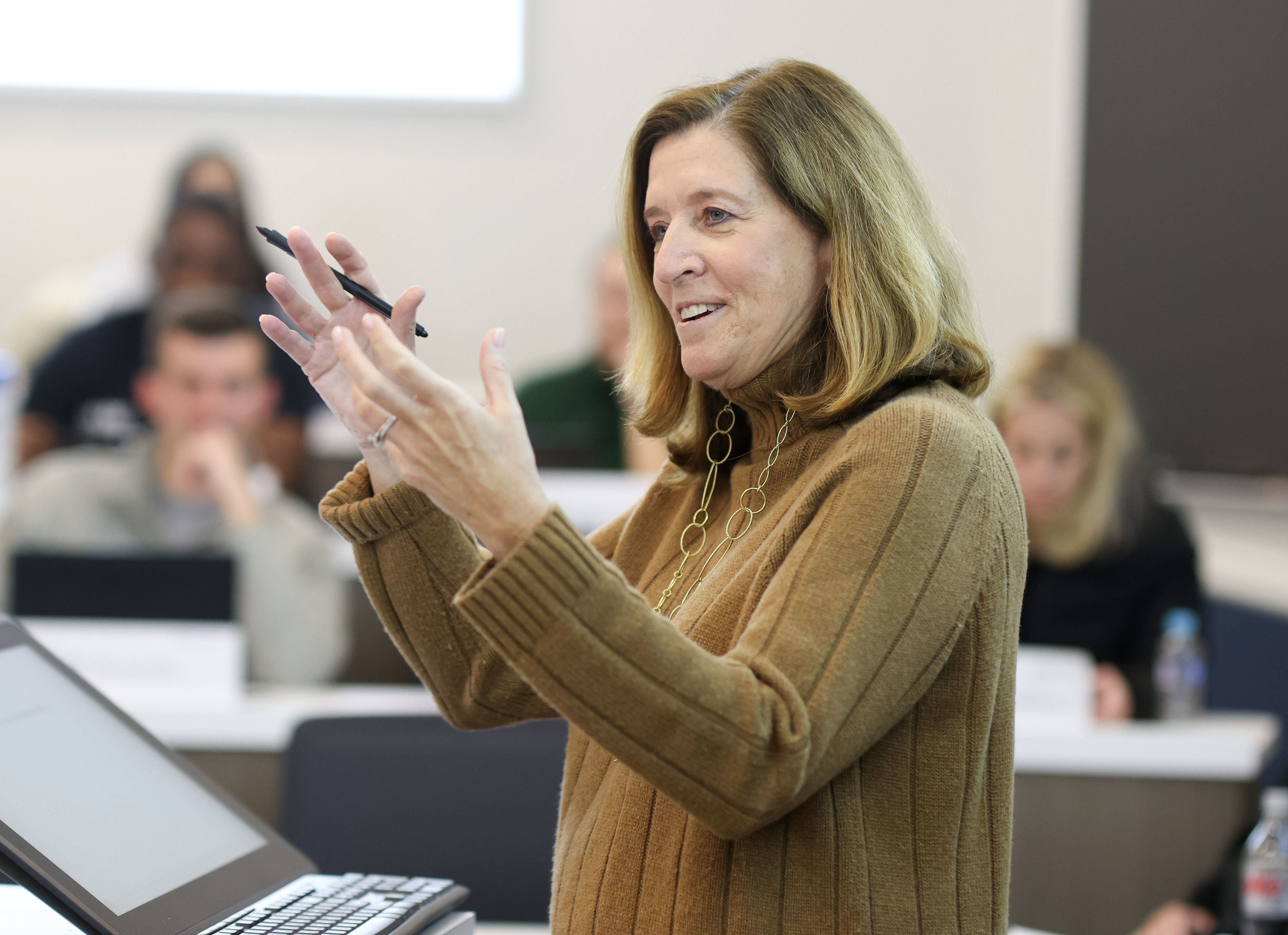
As one of just a few business schools to use the case method exclusively, Darden places tremendous value on hiring experienced practitioners like Riefberg. The school was aware of Riefberg’s strong reputation at McKinsey and was determined to bring her on board. However, convincing Riefberg to make such a drastic pivot in her career, especially at a time when she was thriving at McKinsey, would require some persuasion.
“If you had asked me a few years ago if I would be teaching in higher ed, I would have said no way,” said Riefberg.
But Darden was persistent.
“They made a compelling case,” she said.
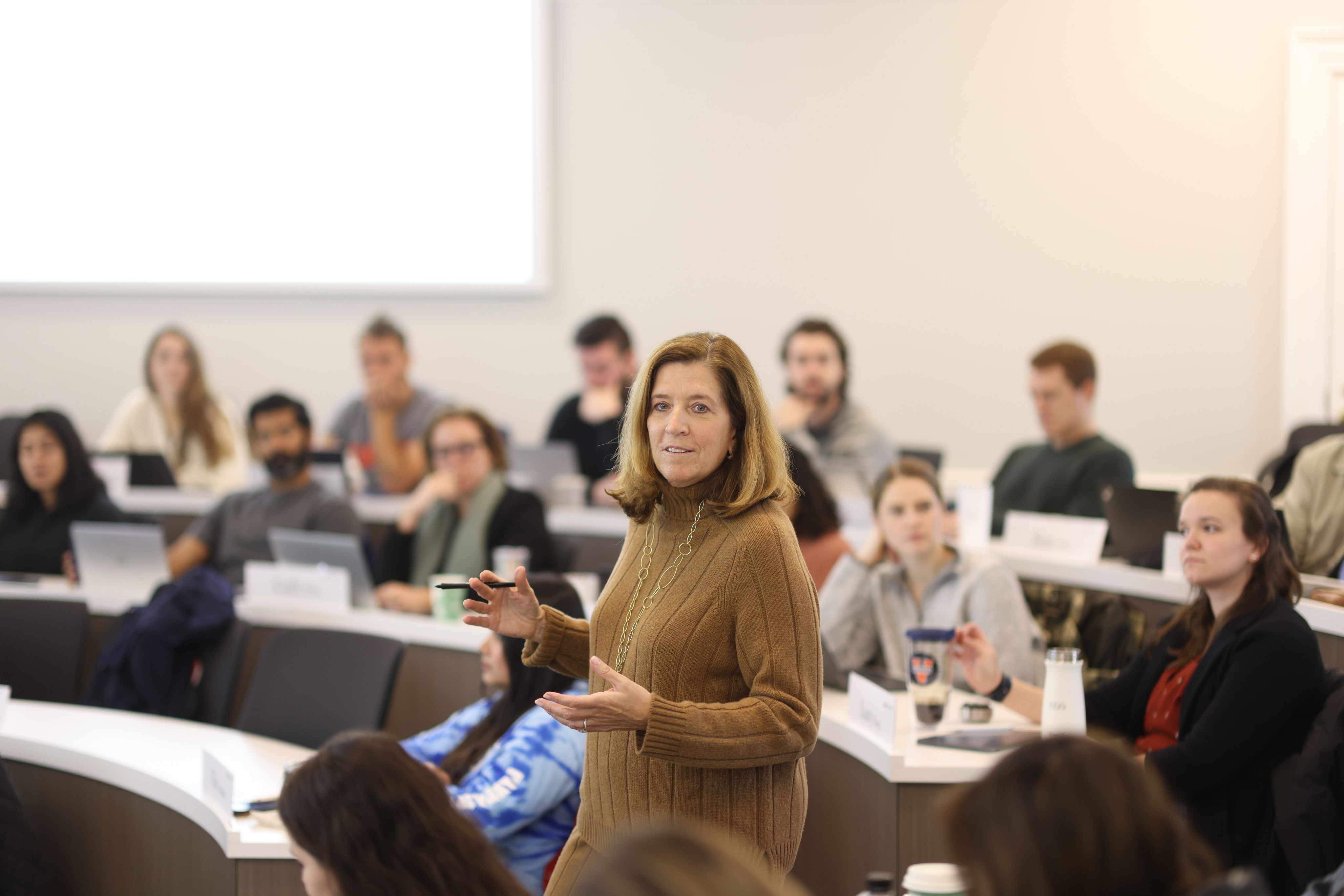
Darden gave her the opportunity, as she puts it, “to dip my toe in the teaching waters.” Riefberg, who was not yet sold on the idea of teaching full time, started out co-teaching evening and weekend courses in the Executive MBA program while continuing to work at McKinsey. The experience was eye opening.
“Teaching inside the Darden classroom, it turns out, is a lot of fun,” she said.
“The case method is a game changer. I would have never wanted to stand up and simply lecture, but it is rewarding to engage with experienced professionals, as well as more recent graduates, and help them find their voice, their confidence, and their ability to lead.”
Having ignited Riefberg’s passion for teaching, the school still needed to extend a compelling offer. With the support of the Jefferson Scholars Foundation, an independent organization whose mission is to attract to UVA exceptionally talented students and faculty, Darden was able to do just that.
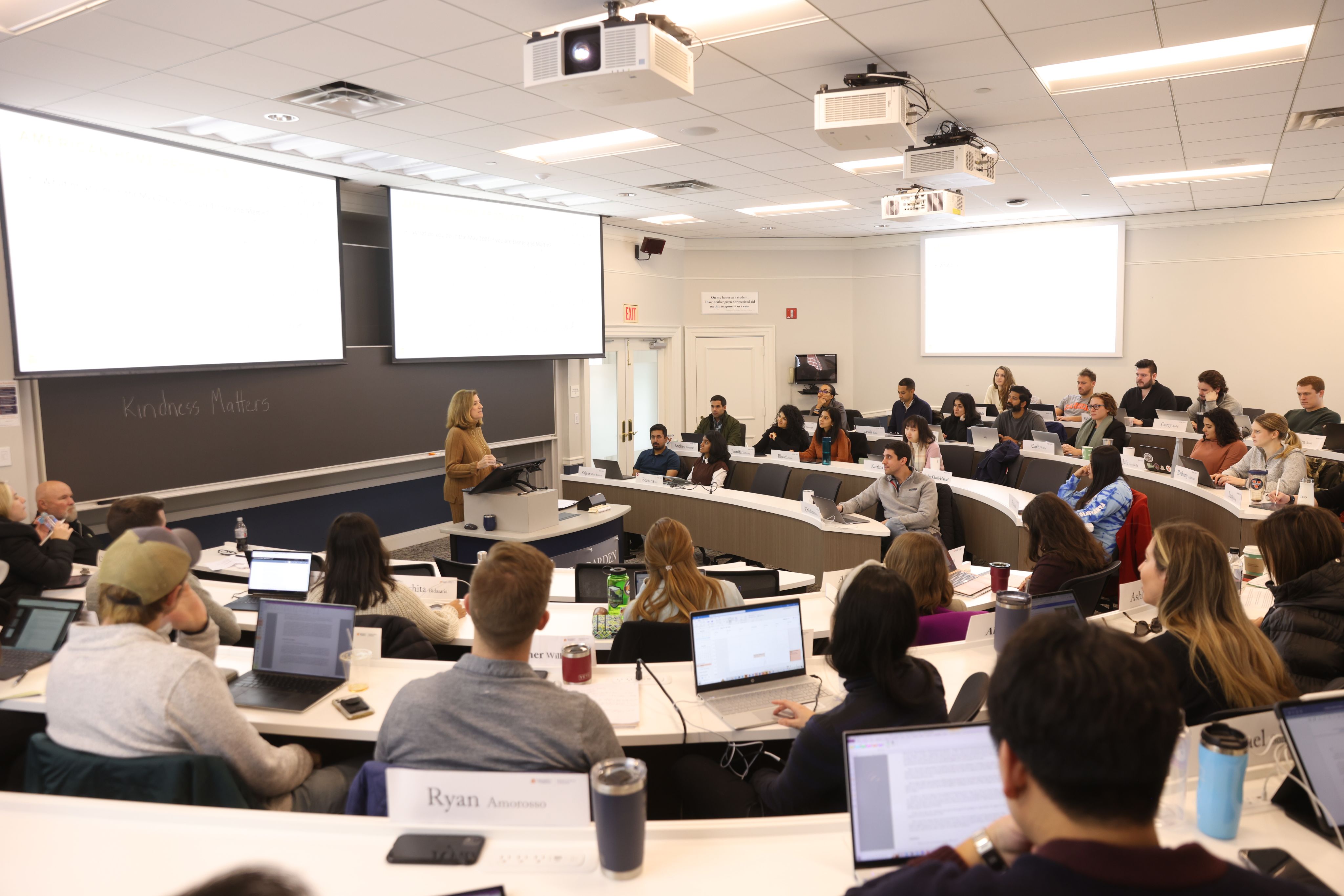
Ten years ago, the Foundation launched its Distinguished Professorship Program with the intention of recruiting talented faculty like Riefberg across multiple fields of study. With funding to support the effort now in excess of $170 million, the Foundation continues to attract to UVA internationally recognized scholars and leaders across multiple fields through a series of $5 million endowed professorships.
Today, Riefberg brings her expertise to the Darden classroom as the David Walentas Jefferson Scholars Foundation Distinguished Professor and is among six UVA faculty currently funded by the Foundation. They hold positions across the University, teaching in the College of Arts & Sciences, the School of Education and Human Development, the Law School, the McIntire School of Commerce, and the School of Medicine. Active searches are underway for seven more professorship holders. In time, and with continued fundraising success, the Foundation expects to support as many as 25-30 professors at UVA, at least a couple of whom will join Riefberg at Darden.
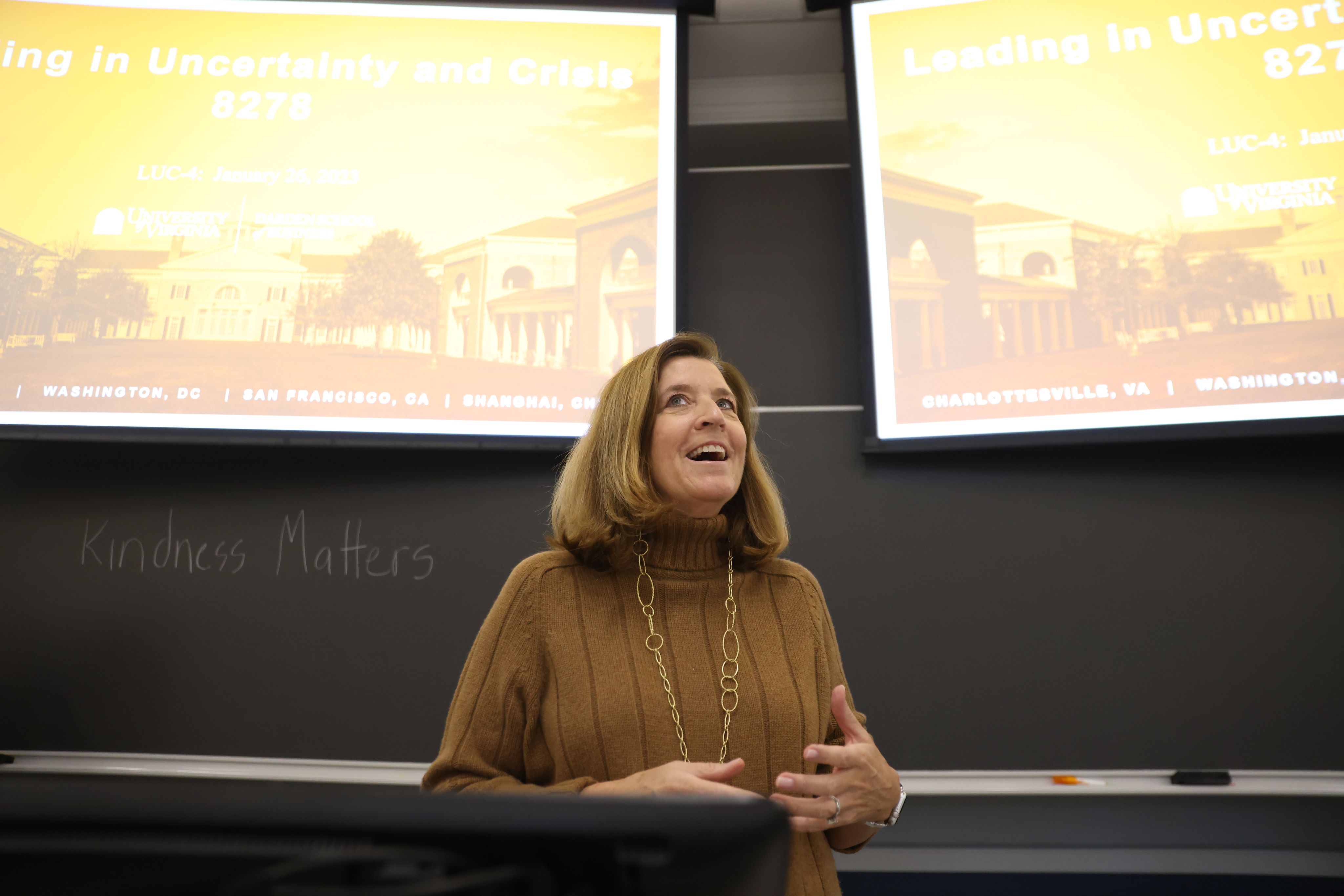
“The investment we are making in UVA faculty is substantial,” said Jimmy Wright, president of the Foundation.
Wright has no doubt that it is an investment worth making.
“Our expectation is that the professors we attract to the Darden School in particular will render an invaluable service to the business world and to society at-large,” said Wright. “Experienced practitioners like Professor Riefberg are uniquely fit to train decisive leaders and prepare them to face tough ethical and economic dilemmas.”
As the world recovers from a global pandemic and the prospect of an economic downturn tests organizational resilience across multiple industries, Wright believes the impact of Riefberg’s work inside the classroom is more important than ever.
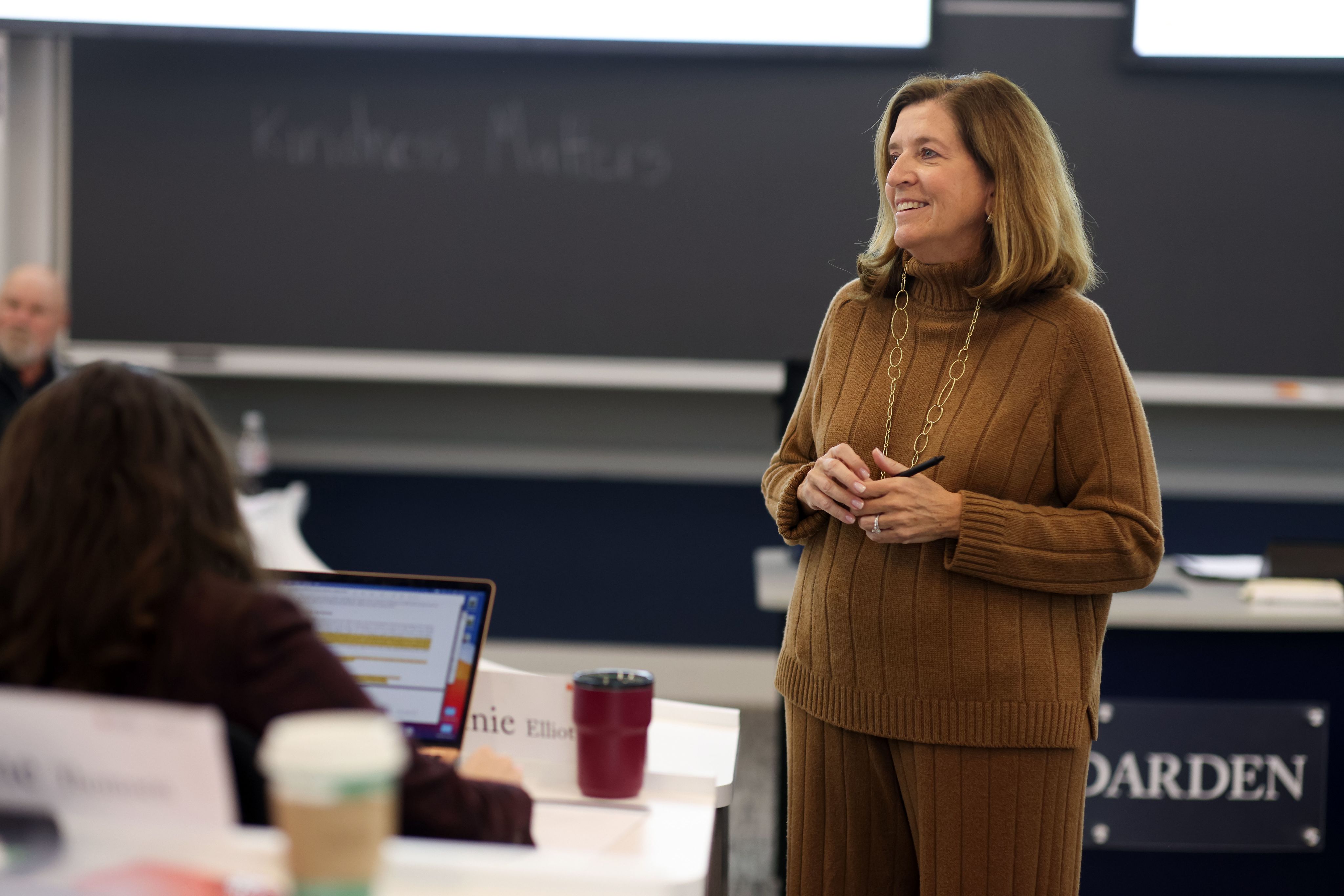
For Riefberg, despite not being a trained academic, she has no doubt that she is exactly where she belongs. The Foundation’s endorsement and support of her has gone a long way in offering her that sense of belonging, and, she feels, gives her credibility and confidence in a field that is relatively new to her.
“To walk into a classroom or a faculty meeting with the Jefferson Scholars Foundation behind you is reassuring and eliminates any doubt that I can’t do this,” she said. “In addition, they are supporting my research, which includes interviewing executives who have led in uncertainty and crisis.”
She also appreciates Darden’s focus on teaching and the students’ experience. “Research is important at Darden, but everything there starts with the students. I like that orientation,” she said, “and I know the real-world, practical experience I bring to the classroom is useful.”
At the end of class, after her students have worked together to identify the uncertainties and potential crises in each case, be it a terrorist attack, a data breach, or a natural disaster, they are given the opportunity to stand in the shoes of an executive and make a recommendation for how to move forward.
“It’s more than a frivolous academic exercise; it’s practice. It will prepare them one day to face the ongoing uncertainties and crises that periodically present themselves at the intersection of business and society,” Riefberg said.
Ten years ago, the Foundation launched its Distinguished Professorship Program with the intention of recruiting talented faculty like Riefberg across multiple fields of study. With funding to support the effort now in excess of $170 million, the Foundation continues to attract to UVA internationally recognized scholars and leaders across multiple fields through a series of $5 million endowed professorships.
Today, Riefberg brings her expertise to the Darden classroom as the David Walentas Jefferson Scholars Foundation Distinguished Professor and is among six UVA faculty currently funded by the Foundation. They hold positions across the University, teaching in the College of Arts & Sciences, the School of Education and Human Development, the Law School, the McIntire School of Commerce, and the School of Medicine. Active searches are underway for seven more professorship holders. In time, and with continued fundraising success, the Foundation expects to support as many as 25-30 professors at UVA, at least a couple of whom will join Riefberg at Darden.
“The investment we are making in UVA faculty is substantial,” said Jimmy Wright, president of the Foundation.
Wright has no doubt that it is an investment worth making.
“Our expectation is that the professors we attract to the Darden School in particular will render an invaluable service to the business world and to society at-large,” said Wright. “Experienced practitioners like Professor Riefberg are uniquely fit to train decisive leaders and prepare them to face tough ethical and economic dilemmas.”
As society recovers from a global pandemic and the prospect of an economic downturn tests organizational resilience across multiple industries, Wright believes the impact of Riefberg’s work inside the classroom is more important than ever.
For Riefberg, despite not being a trained academic, she has no doubt that she is exactly where she belongs. The Foundation’s endorsement and support of her has gone a long way in offering her that sense of belonging, and, she feels, gives her credibility and confidence in a field that is relatively new to her.
“To walk into a classroom or a faculty meeting with the Jefferson Scholars Foundation behind you is reassuring and eliminates any doubt that I can’t do this,” she said. “In addition, they are supporting my research, which includes interviewing executives who have led in uncertainty and crisis.”
She also appreciates Darden’s focus on teaching and the students’ experience. “Research is important at Darden, but everything there starts with the students. I like that orientation,” she said, “and I know the real-world, practical experience I bring to the classroom is useful.”
At the end of class, after her students have worked together to identify the uncertainties and potential crises in each case, be it a terrorist attack, a data breach, or a natural disaster, they are given the opportunity to stand in the shoes of an executive and make a recommendation for how to move forward.
“It’s more than a frivolous academic exercise; it’s practice. It will prepare them one day to face the uncertainties and crises that periodically present themselves at the intersection of business and society,” Riefberg said.


“To walk into a classroom or a faculty meeting with the Jefferson Scholars Foundation behind you is reassuring and eliminates any doubt that I can’t do this.”

Learn more about the Jefferson Scholars Foundation’s Distinguished Professorship Program here. This content was paid for and created by Jefferson Scholars Foundation. The editorial staff of The Chronicle had no role in its preparation. Find out more about paid content.


